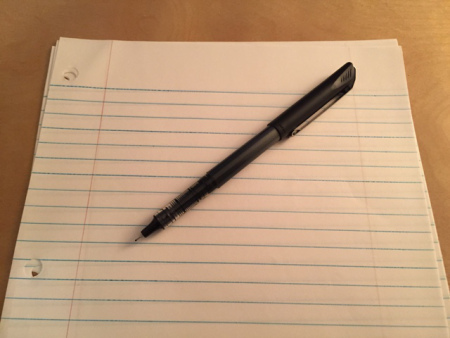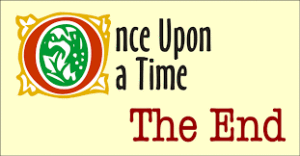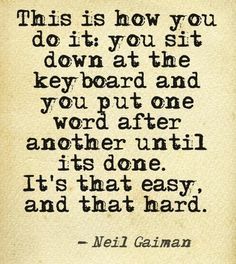Eric Witchey's Blog: Shared ShadowSpinners Blog , page 20
October 26, 2016
In Which I Muddle Through a “Blah” Writing Day … Week … Month …
 By Lisa Alber
By Lisa Alber
I don’t know what’s going on with me. I’ve written 700 words on three different topics for this blog post and nothing’s working.
Goddess-y neighborhood coffeehouse anecdote? Yeah … Could have been humorous or thought-provoking. Now, it’s just as dull as my thoughts.
Novel development process? Perhaps, but this has been a problem for the past month–whatever process I thought I had doesn’t seem to be working.
Novel research topics? Feels like you gotta be here in my head to be interested in these topics, and, frankly, I’m not even enthused right this second.
This is a truly strange feeling. Normally, once I get going, I’m OK. Blog posts are *never* an issue. I can always spin a thought into 500 decent words.
So, I don’t know. Whatever it is, it’s the same thing that’s hampering my novel development process. A few days ago, on my personal blog, I was certain it was the election cycle clogging up my brain. Could be. Have you read the articles about the anxiety that this cycle is causing? Election anxiety is apparently a thing–and this thing is affecting folks in record numbers. If this is what it is with me (and I won’t know for sure until later in November when I can look back on these weeks), then, holy crap, what kind of toxic environment are we living in at the moment?
And why am I susceptible to this anxiety? (That, my friends, is probably a question for a therapist.)
You’d think I’d be able to shuck off BS and rhetoric and worry and fear … I succeed for a little while then find myself online again, sunk in articles and commentary. My brain’s been taken over by — politics. ACK.
There’s something worrisome going on that’s larger than either of the candidates–don’t you feel it? Something might have to give, to seriously give, at some point … But maybe that’s just my anxiety talking.
So how to muddle through? I’d actually rather not muddle. I’d rather just do–but if muddling is where I’m at, I figure there are a few things I can do:
Show up at the computer at my regular writing times.
Open Scrivener (my writing software) and the last file I was working in.
Engage in one thought related to whatever’s in that file.
Write something in relation to that thought.
That’s about it. Normally one thought leads to the next–but I can’t count on that at the moment, it seems.
One thought does keep going through my head: This too shall pass. I didn’t understand the simple yet sublime wisdom within these four words when I was younger; now I find them a comfort. The election cycle will pass and so will this funky headspace I’m in.
Here’s my contract with you: I just opened Scrivener, and I see that my last brainstorming thought for the next next novel (for 2018, cross fingers!) related to a character named Kevin, and his quest for answers about his birth family. So here’s what I’m going to do right now: his character sheet, which is to say his character arc and motivation for this story.
OK!
How do you muddle through when the going gets sloggy? Are you feeling any election anxiety–how are you coping?
Tagged: anxiety, elections, novel development, writing


October 19, 2016
Pain and Productivity
by Christina Lay
I’ve been trying to write about this subject for a long time, but it’s one of those topics that has always been little too personal, a little too close to the bone, to get any objectivity on. I start writing and I get defensive. But tonight as I sit down to write a post due tomorrow, and another due the day after tomorrow, grim reality hits home once again.
Damn, I say. And then I wonder, is there anything helpful to be gained by shining a bit of light on this back-riding monkey of mine? Well, let’s take a look at where I was when I first tried to write about it, nearly two years ago:
I’m here because the voices in my head have driven me write this blog. These are not the ordinary writerly voices of characters whispering dialogue and plot suggestions to my fevered imagination. These are the voices of The Committee. You know, the raging discussions about shoulds, wants, have-to’s and why-the-hell-nots. Some of the voices come from bottles: pill bottles to be exact.
No, I’m not an addict, but I could be. Sometimes painkillers (legally obtained, mind you, NSA internet scanning friends of democracy) are my best friends. At other times, they lurk in the kitchen cabinet like an evil troll under the bridge, luring me to my doom.
The conversation goes somewhat like this:
Me: Damn, my back/neck/hip hurts, but I need to write.
Cyclobenzaprine: If you want to get any sleep tonight, you’d better take me now.
Fairy of Good Intentions: But if you do that you won’t be able to concentrate long enough to finish that novella/blog post/chapter/submission.
Tramadol: Or you can take me and not give a shit.
Troll of Unworthiness: Suck it up, loser! Only the weak and worthless let a little back pain interfere with the relentless pursuit of their dreams! Not only should you not medicate, but you should stay up really late!
Coffee: I’m up for that.
Fairy of Good Intentions: If you’d listened to me, you would’ve finished yesterday instead of watching Veronica Mars on Netflix.
Me: Okay, Cyclob you win, but I’m going to stay up late and write gibberish thanks to you.
Troll: Well, as long as you suffer for your art.
I’ve often wondered how much more productive I’d be without this chronic back pain of mine, but let’s face it, I might not even be a writer if I didn’t have the physical limitations that I do. I might be a ballerina or one of those annoying Globe Trekker people. I might be a different person, in other words, so it’s useless to speculate or write stupid blogs about.
Frieda Kahlo is one of my inspirations. Not because I’m a huge fan of her work but because she overcame great physical challenges to create it. I know my problems pale in comparison, but I’ve set her up as a challenge to myself when the pain and the painkillers conspire to distract me from my goals. And the goal is always to get something done. There is always the next something. The next story. To stand still, to medicate, is to let the story die.
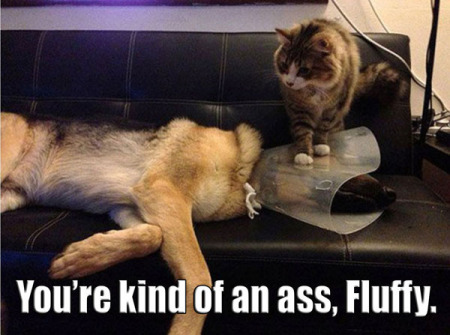
Whoa. Melodramatic and bit sad. I’m happy to say that overall the intensity of my chronic pain has lessened and I don’t face these kind of nights nearly as often. And with a little perspective, I can now see that what is sad is not that I am tragically afflicted with a bent spine, but that I am so damn hard on myself. The only thing that dies when I fail to write is my sense of humor.
I’m not sure where I got this fear of stopping. Maybe I was a shark in a previous life. But there, now I’ve done it, I’ve pushed through the pain to write about pain and ask, how important is productivity? How important is making deadlines? We can only face one hurdle at a time and answer the question anew every time, but the important thing to remember is to be easy on ourselves, no matter what we decide to do or not do.
I know I’m not the only one who feels driven to ignore the body’s warnings in order to keep moving, to achieve, push, strive and continue on when really I should just lie down with an ice pack on my neck. The world will not end if my ShadowSpinners post is a day late. The story will not die. The words might be different tomorrow, as I might be different. Less grumpy, more refreshed and ready to write, ready to play in the garden of my imagination.
Tagged: dealing with pain, productivity, writing, writing habits


October 12, 2016
Why Write Anything?
If we’re going to make something, let’s make the things we want to see exist in this world. If you’re writing a story, whatever the genre, write the story you want to read, drawing from the deepest motivations you can find. This is the best way I can imagine of both insuring some measure of originality and significance to your work, as well as an ongoing enthusiasm for doing it. And really, anything else is short changing yourself and everyone else as well.
In this age of social media, online reviews, sales rankings, marketing platforms, focus groups, and target audiences, not to mention a widespread obsession with social status and material success, it’s perhaps all too easy to lose track of why we would write something to begin with. So ask yourself: why do you want to write this? Really get into it, with whatever current project you are on. If you find a really good answer that doesn’t draw on thoughts of success, I guarantee that work will become more interesting.
Not that social media, markets, and reviews and all that are inherently bad. It can all be useful, and careful use can maybe help you make a buck from this crazy racket. But their best use, I would argue, is not in your creative process. Someone who writes a book about vampires because vampire books are selling well, is only writing a book about book selling and nothing else. Forgetting all that, and the fact that vampires were more a thing of the ’90s, if you have an idea for a vampire story you really want to read, then I say go for it, especially if you have an even deeper reason for wanting to write it.
Of course, most writers would like their stories to be read and enjoyed by a wide audience. Whether this is a touch of narcissism or not I don’t know, but either way I think the desire is ennobled by a pure creative spirit. Sure I want to be entertained, but I also want to read a stories with a vision beyond sales, by writers who had some motivation deeper than popularity, broader than recognition, and more profound than success.
Tagged: creative process, inspiration, Matthew Lowes, writers, writing


October 5, 2016
Creativity and Brain Hacks, by Eric Witchey
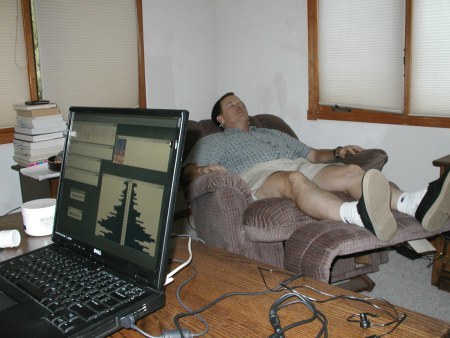
Eric Hooked Up and Meditating
Creativity and Brain Hacks, by Eric Witchey
A few months back, several people suggested that I write more blogs about “your brain hacks.” At the time, I found that sort of amusing because all the writers I know do the best they can with what they have. We are all born with our physiological predispositions (talent), and we all work hard to adapt body and mind to the tasks we value (skill). So, I sort of figured everyone has their own brain hacks. I still do.
Recently, I made a little speech in Eugene, Oregon about how writers can use tempo tools to influence their creative states, idea production, and writing speed. After that speech, a good friend reminded me that I had promised to write about brain hacks. So, I took a look back at my world and my experience and considered what things I had to learn to do in order to write stories.
Here’s the thing. When I teach, I can’t teach things I do but don’t know I do. I can’t teach things that come to me intuitively. I can only teach the things I had to consciously learn. Whether by luck or by some perverse curse, I had to learn a lot. Again, whether by luck or curse, I had to learn to overcome certain physiological limitation of mind and temperament. Many writers do. Mindfulness meditation has been a huge help in overcoming my personal limitations, but that’s another essay.
So, here’s a brain hack I had to learn.
Creativity is a learned skill. It is a verb: to create, created, creates, creating, will create, had created, have created, will have created.
The brain is a pattern matching and inferencing system. It recognizes patterns, cross-references them, and correlates them to experiences. The activity in the brain can be, somewhat erroneously, described as interacting ripples of potential. When rippling troughs meet peaks, they cancel out. When peaks meet peaks, they amplify. When amplified ripples reach a certain threshold, we become aware of the “thought.”
So far, so good. That’s all automagical. We don’t even know it’s going on.
However, many people, writers included, believe without consideration that if the thought they have more-or-less fits the shape of a problem they have, they are done. Sometimes, they are, but my brain was a bit bent out of shape from the start, so I had to learn to express a thought, abandon it, and find another one, and another one, and another one… I had to learn to keep finding new ideas until I found one that would work really well in text in a story that would then be interpreted by the pattern-matching inferencing system riding around in the reader’s head.
Many writers call this “finding the third alternative.” Personally, I wish I only had to find three.
Instead of the normal three, I have to find ten, twenty, fifty.
Enter a guy I’ll call Brian the Brain Guy (BBG). He’s a psychologist who hooked me up to an electroencephalograph in order to study the ripples in the brain during creative activity. I won’t go into the tech or what happened, but I will say that it caused me to look at my creativity tool, my brain, differently than I had. I stopped thinking of it as a piece of standard equipment that either worked or didn’t, and I started looking at it as a tool that could be modified, sharpened, and improved. I learned that it could be trained.
So, I started ringing a bell every time I began writing. That is, I started to type, then I rang the meditation chime, then I continued typing. I typed as fast as I could, and I work furiously until I fell into that magical trance of creativity called a flow state.
Fast forward a few years, and my brain has been trained to enter flow state when I ring a bell.
Here’s another hack.
I took a page out of one of my teacher’s playbooks and started using a metronome during brainstorming sessions. I start it slow, and I have to come up with an unjudged new idea for each tock of the metronome (an app on my phone now). Then, I increase the tempo. Automatically, the brain that has been delivering an idea per tock at slow speeds ramps itself up to present new ideas at the new pace. For the brain geeks who want to try this, I start out at a tock every ten seconds: six per minute. My fingers can’t keep up anymore at about fifteen per minute. My brain is willing, but my fingers are not fast enough on the keys. Considering that my original, uninfluenced pace was about one new idea per fifteen minutes (and sometimes per week), that’s a huge improvement.
Because when BBG had me hooked up he was observing and measuring particular wave forms, I started paying attention to biofeedback tools for inducing and maintaining those wave forms. This was particularly important to me because it helped me reduce the amount of medication I needed in order to manage the bent brain problems I mentioned above. Back then, it was hard to find such tools. Now, they are freely available on the internet. Here’s a link to one such “entrainment video” I use. Try it. Relax. Just let it run quietly while you are creating.
Don’t let it run while you are editing. Different brain states. Oh, and run it very quietly. The brain doesn’t need it to be loud. In fact, the brain will pick up on it even if you think you can’t hear it. I’m running it right now at volume 1 on my headphones. I have to concentrate on it in order to hear it.
https://www.youtube.com/watch?v=EbU8rndchsk
Caveat: Some people experience mild dizziness the first few times they listen to a recording like this one.
Finally, I will give away the biggest, best brain hack I have ever learned.
Intuitive writing comes from the subconscious mind. It flows effortlessly through the fingers to the screen or page. It requires no thought, and when we come up for air from successful, intuitive sessions, we have no sense that time has passed.
Conscious writing requires self-aware thought, planning, execution, and repetition. We know we are doing what we are doing, and time drags out like the slow-motion shootout in the Matrix.
Before I give you the big brain hack, I want to say something important. In my personal experience, there is no quality difference between the two modes of production. Conscious, intuitive, or mixed, each has a distinctive, physiological feel. The results of the different creative modes are different in content. However, my records show that, at least for me, the revision time needed to take raw text to a sold story is exactly the same either way. The techniques applied are a bit different, but that’s all.
Okay, here’s the big brain hack.
The subconscious makes use of everything we are exposed to. EVERY FREAKING THING.
The more we consciously understand writing and creativity, the more the subconscious has to work with. People who avoid reading about writing, reading other writers, or studying creativity are limiting the raw materials available to the subconscious. The more we expose ourselves to grammar, punctuation, meta-descriptions of story, methods, processes, and techniques, the more likely those skills are to manifest in our flow state sessions—drawn straight up from the subconscious mind.
My best advice to the writers I meet at the conferences, seminars, and lectures I do is to constantly learn about the craft of writing. Immerse yourself in it. Practice techniques until they become part of the deep self from which dreams flow. Then, let it flow!
-End-
Eric’s Upcoming Speaking Events:
28th-30th: Ghost Story Weekend: A weekend of scary story writing. http://wordcraftersineugene.org/programs/ghost-story-weekend/
1st: Creative Tempo: Lecture and demonstration of some of the above at Old Church for Willamette Writers. http://willamettewriters.org/event/willamette-writers-portland-monthly-meeting-2016-10-04-2016-11-01/2016-11-01/
5th and 12th: The Plaid Bunny Workshop: Two Saturday Seminar on developing universal core thematic power in short stories and novels. http://wordcraftersineugene.org/programs/the-plaid-bunny-workshop/
April: Wordspring Creative Writing Conference in Chico California. Topics to be announced.


September 28, 2016
The Accidental Blog

By Cheryl Owen-Wilson Following is how this blog was born, even though I tried to blow it off. I really did try. I’m on vacation, I reasoned. I deserve an entire day of no obligations. I’ll do it tomorrow, what difference will one day make? You get the idea.
So there I sat mid-day today reading my friend, Lisa Alber’s newest book, “Whispers in the Mist”. I was quite content in the fact that I could just let the blog go for the day. I’d intentionally kept this book unread until I had time to spend an entire day immersed in the misty fogs of Lisfenora, Ireland, where the book takes place. And I was there, happily reading away, when the atmosphere in her novel caught me, spun me around, and said, the weather in this book is as much a character as the actual humans are. So I blame you Lisa, for giving me a perfectly good idea for a blog, that I now have to write so I can get back to finishing your amazing new book.
“The storm starts, when the drops start dropping
When the drops stop dropping then the storm starts stopping.”
― Dr. Seuss
Here are just a few of the many ways weather can enhance your fiction:
Atmosphere or Mood: My writing contains many references to the Deep South of Louisiana. From heat that flows around you like cane syrup, sticky and sweet, to rain that hits so hard you have welts on your skin for days. My characters are steeped in the slow pace caused by my home state’s oppressive heat. Lisa used the fog and mist instantly associated with Ireland to draw readers into her evolving mystery. Many horror writers use storms under the cloak of night to create the appropriate atmosphere. What type of weather could you use to draw your readers in?
“Summer in the Deep South is not only a season, a climate, it’s a dimension. Floating in it, one must be either proud or submerged.”
― Eugene F. Walter, The Untidy Pilgrim
“The rain thundered down so heavily that Pritam could imagine that space itself was made of water and was pouring through rents in the sky’s tired fabric.”
― Stephen M. Irwin, The Dead Path
Tension: My writing mentor forever lives in my brain. This is one of many things she whispers while I write. “Just when you think you have enough tension in your story, make more.” My characters are human with human limitations. I have to give them plausible situations, believable responses. But when I throw the unpredictability of weather into the equation, well, that is a whole different set of rules. Hurricanes have been featured in my stories. They’ve possessed gale force winds that left fathers dead in branches of the only cypress tree left standing, and chickens flying past second story bedroom windows. “Twister” is one of my favorite movies. Given the recent weather in my home state, which caused extensive flooding, I now have a new story percolating. Imagine what creatures a spontaneous flood could unearth! What natural disaster might befall your characters? What would they learn about themselves, or others, as a result?
“Dark and pregnant clouds gave birth and fist-sized stones of hail hammered the earth.” ― Michael R. Fletcher, Beyond Redemption
“The November evening had a bite; it nibbled not-quite-gently at her cheeks and ears. In Virginia the late autumn was a lover, still, but a dangerous one.”
― J. Aleksandr Wootton, The Eighth Square
Irony: It doesn’t always have to be nighttime and raining when the bloody corpse is discovered in a field, amongst trees who’s naked limbs reach to grab any passers by. What if it’s a perfectly beautiful day and your protagonist is strolling leisurely through a field of wild flowers? She’s just reached down to pick a flawless daisy when she notices the ruby red liquid dripping from its white petals and looks around to see severed limbs nestled within the field of vibrant spring colored flowers. A bright, sunny spring day filled with bloody body parts makes a very interesting contrast. So next time you go for the dark and stormy night switch it up a little, and see where it takes you.
“It is a common fault of men not to reckon on storms in fair weather.”
― Niccolò Machiavelli, The Prince
“It’s so dry the trees are bribing the dogs.”
― Charles Martin, Chasing Fireflies: A Novel of Discovery
In conclusion remember, unless atmosphere/weather happens to be an actual character in your novel, don’t drown your reader with too much of it. Small doses interspersed to give the proper setting, or steer your character in the right direction, are all that is needed.
“one day you stepped in snow, the next in mud, water soaked in your boots and froze them at night, it was the next worst thing to pure blizzardry, it was weather that wouldn’t let you settle.” ― E.L. Doctorow, Welcome to Hard Times
I do hope you write a vicious storm, snowy blizzard, sun-baked day, torrential rain…the variations are endless, into your next story. As for me, I’m going to cozy back up with Lisa’s book. The atmosphere outside where I am vacationing, here on the Oregon coast, is perfect. A fog is rolling in and I can literally feel the waves pounding below my balcony.
Have you found other ways in which weather has enhanced your own writing or a favorite book?
Tagged: atmosphere, creative process, horror, writing, Writing Dark Fiction


September 21, 2016
Is a Sentence a Story?
Is a Sentence a Story?
By Cynthia Ray
It is said that Hemingway once wrote a story in just six words (“For sale: baby shoes, never worn.”) and called it his best work.
There are contests and websites dedicated to the one sentence “story”. Is one sentence a story? A haiku perhaps, an engaging thought or intriguing question, but is it a bona-fide story?
There are anthologies of 55 word stories, and books of 500-word fiction. They are interesting, artistic and sometimes haunting and beautiful, but when I settle in on a rainy Saturday afternoon with a good book, I turn to longer, in depth, even rambling books, trilogies and Russian novels.
Is the one sentence story a sign that our attention span as readers has shortened, or have we simply added and expanded to the craft, playing with words in new and fun ways?
In my writing group, I got feedback on the length of my stories, and it reminded me of the fable of the three bears. Some were toooo long, some were tooooo short, and a few were just right, and it made me ask, “Is there a perfect length for a story?”
Some short stories were perfect in their 500-word essence. Others required 10,000 words just to get started. It made me think of the creative process; when I start a story, I don’t know how long it will be. I’ve started out to write a novel and ended up with a 3000-word short story, and I’ve started with a short story that turned into a much longer project.
In the end, word count is just another aspect of story telling, to be considered along with tone, theme, conflict, plot, characters and everything else. It is not that important to focus on, except when we don’t get it right. A story that is too long or short can leave your reader feeling bored, or unsatisfied, without knowing why.
As Neil Gaman said:
Tagged: art, author, creative process, creativity, fiction, Novel Writing, short stories, Short Story Writing, writing, writing habits


September 14, 2016
Is Writing Fun?
Is Writing Fun?
Well, yes. And no.
Writing is fun when I’m engaged in a project that I’m excited about, when the words flow, the characters come alive, I have time and solitude in which to immerse, and the muse and I are aligned as one.
Writing is not fun when there are too many distractions, when the plot holes develop, when I’m tired and the words are stuck like molasses in my psyche, when I feel like everything worthwhile has already been written, when I feel like a fraud and/or incompetent, and when I feel all that pressure to compete in the marketplace.
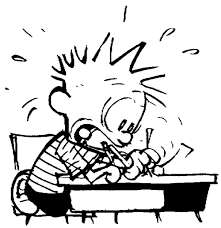
On a panel last April I was asked: “Will you ever retire from writing?” I’m sorry I gave the answer I did. I cited Chuck Barris of “Gong Show” fame, who said that when he quit the show he was going to move to the south of France and read books nobody would read. That sounded glorious to me at the time, as I was struggling with editors, publishers, agents, marketing, and trying to write all at the same time. But I didn’t speak very eloquently about why that quote stuck with me.
What I should have said is: Do retired tennis players still play tennis?
Today I have fifteen books in print and am nearing the end of my writing career. I have the luxury of not worrying about much on a professional level. I write what I write. I abandon projects with abandon. I don’t cater to deadlines or others’ expectations. I don’t read my reviews (never have), and I don’t care what other people think of me or my work.
But it hasn’t always been this way. For decades, I struggled in the industry like everybody else.
Today, writing is fun for me. I’m working on a project now that makes me laugh out loud when I write, and at the end of the day I am wrung out and can’t wait to get back to it again tomorrow. There is no bleeding into the keyboard. There is no howling angst. I am not pouring my heart and soul into this work, I am playing, joyfully, with the talent I have been given, and I love it.
Will this project be successful? It already is.
So. What about you? Is writing fun?
Tagged: agents, angst, Characters, creative process, deadlines, editors, gong show, joy, Muse, publishers, retirement, writing


September 7, 2016
What I Did on My Summer Vacation
 By Lisa Alber
By Lisa Alber
You know what’s funny? Since my last post here on ShadowSpinners, my second novel launched–woohoo!–but I’m already so far beyond the fact of it, that I’m not going to tell you about the book, WHISPERS IN THE MIST. Easy enough to get information online, if you so desire.
I spent most of my summer feeling harassed by the specter of the public life (readings, launch party, etcetera) and stressing out about promotion and publicity tasks. Plus, August was shite-meet-fan deadline time for my next novel, you know, the untitled one that’s coming out next year around this time? Yeah, that one. And, frankly, book launch was getting in my way. I wanted it done and gone and behind me, which only added to my stress.
After awhile, I imagined WHISPERS like a baby too long in the womb: Get this bloody thing out of me! A tad dramatic, true, because it’s thrilling to have a book come out, but that doesn’t change the fact that I’d practically forgotten what WHISPERS was about because I was so immersed in the next next novel.
My head at the beginning of August: I have to talk about WHISPERS now? Yeesh … Can’t I hole up with my deadline for the next novel? Really, I’m frantic about handing it off to my editor in decent shape. The manuscript needs so much work. It’s an utter tragedy, and the ENDING ISN’T RIGHT!
Plus, I have a day job (alas) with big August deadlines every year, wouldn’t you know it. Plus, for some reason everything the publisher might want and need from me (in addition to the manuscript and authorial book launch tasks) landed in the hopper in August too: flap copy, book cover discussions, proposal for next books. Yee gads.
I’m happy to announce that in the wee hours of Thursday, September 1st, I emailed my editor the manuscript for Novel #3, a.k.a next next novel. And that was it. The black-out curtains closed on Lisa the Author for a full week. I looked forward to a last summer-hurrah (but really, what summer?) Labor Day weekend full of zippity-do-da-nothing that included a marathon of “The Affair,” season two (recommended if only to see how the screenwriter plays with point of view), reading for more than ten minutes in a sitting, and sleeping.
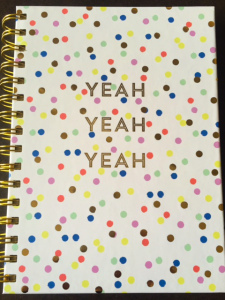 It’s been a restful week, but the new school year has begun and I’m already behind! I probably should have started writing the next next next novel (pub date 2018–isn’t that crazy?) by now. The other night a character revelation popped into my head, so that was a good sign. I bought a new organizational notebook (Christina, you might like it!). I have my first task list in said notebook. I need new business cards and need to prepare for a reading tomorrow night and next week I’m flying to New Orleans for a huge conference and need to–what?–something …
It’s been a restful week, but the new school year has begun and I’m already behind! I probably should have started writing the next next next novel (pub date 2018–isn’t that crazy?) by now. The other night a character revelation popped into my head, so that was a good sign. I bought a new organizational notebook (Christina, you might like it!). I have my first task list in said notebook. I need new business cards and need to prepare for a reading tomorrow night and next week I’m flying to New Orleans for a huge conference and need to–what?–something …
Hold on, wait–the next next next novel! Before I know it, it’s going to be a year from now, and I’ll be freaking out all over again. Number one priority: write first draft. This will be number one priority (and home squalor be damned) for the next, oh … nine months? Do you think I can finish the first draft by June 2017?
So, let the school (writing) year begin!
What’s on your list as the school year begins?
Tagged: book launch, Stress, summer vacation, writing


August 31, 2016
Time Management*: Bullet Points, Mole Skins and the Rabbit Hole of Doom
by Christina Lay
*Warning to those with no time to waste- this post will not help you manage your time.

A while back I wrote a terribly entertaining (never published) post about how intimidated I was by the Stop Time button on my stove. How I wish I had that button now. I’m sure the proper combination of hoodoo, ritual and wishful thinking would summon the dark powers of GE and put the brakes on summer. Maybe then I could finish the next novel, promote the old ones, make ends meet at the EDJs (evil day jobs) and have Time left over to get a tan and a semblance of a life. Actually what I’d really like is one of those dimmer switches, with which to merely slow the relentless march of time on days when I have four posts to write, and speed it up on Mondays during financial audits at work.
I’m not the only one with this problem. Recently on one of my author list serves, this question was broached: What’s your favorite planner? Over 100 back and forth responses over the course of two days ended with a heated Moleskine vs. Leuchtturm debate, complete with youtube videos on bulleting and color-coding. Nothing ironic about that at all.
I’m not an organizer. I’m not a planner. But I should be. My desk is a tsunami of notes, half-filled legal pads, random important looking envelopes, novel-specific journals, journals with no purpose other than to mock me, and calendars stuck open on March, 2014. Trust me, whatever was supposed to happen in March 2014 probably didn’t. Usually I’m okay with this. Panic is a natural phenomena like headaches on Mondays and margarita-cravings on Fridays. Right now it’s panic time, and normally I’m good with that. The problem arises when I dare to think that, just maybe, things could be better, which usually follows an incautious glance at the calendar (the one on the wall that’s opened to the current year and month).
Holy Cow, summer is over tomorrow. In spring I resigned myself to the fact that no money plus no time equaled no vacation. Life and panic attacks would continue as normal. But after a couple weeks of 90+ weather and blue skies, I could no longer deny Summer was happening, and happening without me. I had to do something. Outside. Not involving a keyboard.
Naturally at the last minute before a blistering hot weekend every hotel room in driving distance to cooler climes was booked up by people who plan. People who highlighted August in yellow and drew smiley faces over their blocked out vacation days way back in February. Or possibly just a week ago. Whatever.
A search for dog-friendly cabins led me to yurts in state campgrounds. They weren’t any of those available either. But there were campsites. Very few, which fueled my anxiety. And so I impulsively reserved a spot over on the coast, a mere hour away. It’ll be fun, I said. The dog will like it, I thought. I’ll go swimming and have a day-long summer. Never mind that I hadn’t been camping in over 20 years. Never mind that the campground in question was a Known Refuge for ATV Riding Clan Hoards of Fifth Wheel Ravagers. Nah. Being a single fretful female with an old toothless dog drove me to embrace the idea of a crowded campground.
And now we get to the part where I reveal the secret of Stopping Time. What you do is:
Believe the weather forecast that says it will be nice on the Oregon coast in August; an occurrence more rare than unicorns in your backyard.
Set up a tent in a filled to capacity nightmare inducing outdoor nuthouse otherwise known as a state campground.
Stay.
I’d given myself the option of bailing if it was too awful. It wasn’t too awful. After all, I’d wasted so much of my precious reservoir of time digging out the camping equipment and shopping for survival essentials like flashlights and jumbo bags of chips. I decided a campfire might help get me in the mood. Who doesn’t have fond memories of acidic clouds of smoke blowing into your eyeballs every three minutes? When the rain started I rationalized that it might help quiet things down. Surely the roar of the sand dune destroying ATVs nearby would diminish at sunset, along with whatever paltry warmth remained?
It did and this is when I realized I’d wandered into a fresh-air style Bedlam, as the stalwart sports people and their requisite 15 kids returned and began…whatever the hell it is they do. Mostly yell and scream and ride bikes past my not quite in the road but almost campsite.
The dog and I crawled into our tent and I read by the glow of blessed technology into the wee hours, assuming that at some point the tumult might calm to the point where sleep was possible. And calm it did. Slowly, layer by layer, the hoard settled, thereby allowing the most singularly loud and persistent campers to pierce the night with their befuddled drunken cursing, their hysterical laughter, and their buzzsaw snores. I did eventually doze to the lulling crescendo of the flush toilets about 50 feet from my campsite. And then the magic happened. Time stopped.
Surely this night will end, I thought? Surely the sun will rise like it always does? It didn’t. If only I’d had my laptop, I could have finished the next novel, marketed the old ones, written posts for the next year of ShadowSpinners and possibly knitted my dog a blanket, because he was freezing.
Be warned; The benefits of Stopping Time are very situationally based and it pays to be prepared. However, if you’re like me, this will never happen. No matter how poorly you plan and how long you ignore your basic happy-life needs, time will randomly stop when you least it expect it. If you’re lucky, you’ll get a post idea out of it.
So, Moleskine or Leuchtturm? Bulleting or strikethrough?
Let the trip down the rabbit hole begin.
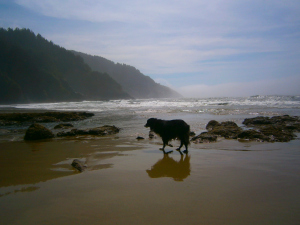
Lazlo – once again proving the journey is more important than where your half-deflated air mattress ends up.
Tagged: balance, creative process, planners, writing, writing habits, Writing Time


August 24, 2016
The Fiction of Reality

Photograph by Matthew Lowes
As writers of fiction we are always trying to project some sense of reality into our stories. We praise the vivid setting when it feels as if we’ve been there. We thrill at events when we can see them happening. And we love the character who seems to walk off the page, fully fleshed, and yes, real. But how does it happen?
The irony is that actual people experience their lives through a variety of thoughts that start to look a lot like fiction. We are, along with everyone around us, constantly telling ourselves who we are, what we’re like, what type of person we are, what we believe, where we come from, the kind of world we live in, and on and on and on. And very little of it has anything to do with what’s really happening right now. We are creating these self-fictions out of the perceptions, sensations, thoughts, and memories that arise in consciousness moment to moment.
Since this is happening in the minds of people all the time, seeing the operation of these self-fictions and understanding how they create conflict could be a great insight into creating fiction that seems real. In short, good fiction must contain the self-fictions of the characters within it. In other words, it must contain characters who have fictional views on the fictional world they inhabit. These views lie at the heart of all internal conflict, and one might say all possible conflicts.
Let’s look closer at what self-fictions are, how they form, and how they come into conflict with each other, with the self-fictions of other people, and with reality itself. A self-fiction is a story you tell yourself about yourself and/or the world. “I am a writer,” is a self-fiction. “I am a good writer”; “I am a bad writer”; “I am a lazy writer”; “I spent 20 years honing the craft of writing only to find out it’s not enough.” These are all self-fictions, and I think you can see, especially if you are a writer, that they are all self-fictions a single person could have. You can probably also see how these thoughts, if believed, will conflict with each other and with various happenings in that person’s life.
I am an American, a Mexican, a Muslim, or a Buddhist; I am a faithful husband, a loving wife, an angry person, a damaged person. Birth is a blessing; life is suffering; death is a bummer. The world is a beautiful place full of good people; the world is a nasty place full of selfish people; the world is made of stuff guided by physical laws; the world is an illusion; the world is God’s creation. And on and on and on. There are enough examples to fill an entire universe. Even something as ordinary as a tree can be a self-fiction. And in most cases, what people experience as reality may simply be a projection of these self-fictions in consciousness.
Such a situation is created through a repetition of thoughts. Every time a thought arises it may become a self-fiction if the mind grasps hold and believes it. The more it repeats the more grasping occurs, and the more real and binding its contents will seem. At this point the self-fiction takes root in the person, and it will continue to seem real and binding even if present experience or new thoughts come into conflict with it. Because all things change, and new experiences and thoughts always arise, conflict with these self-fictions is inevitable. Even the most seemingly accurate and objective self-fiction cannot be right at all times, in all places, and in all situations.
This is all pretty abstract though, so let’s create a more elaborate example. A man and a woman fall madly in love. The man thinks, he could never love anyone more than he loves her. They are made for each other, two people sharing the same love, the same life, the same being. Eventually he asks her to marry him. She says “yes!” and a whole new level of love opens up to them based on the depth, the sincerity, and the promise of this commitment. Of course, he has moments of doubt. Can he really be satisfied with this one person for the rest of his life? Why did she get so angry about the wedding cake? What if she turns out to be like her domineering her mother? They are just little thoughts in conflict with the established self-fiction of their relationship. But, he says to himself, they are in love and love perseveres. Marriage is for life and he is the kind of guy that can stick with someone through thick and thin. So the wedding happens and they start their life together.
Maybe you can see how this goes already, even without the details. While so far they have been sharing a wonderfully pleasant self-fiction, each has other self-fictions. She envisions a house in the suburbs, three children, and traveling the world. He envisions life in the city, no children, and a romance without end. Or whatever. The point being, things change. They argue about moving. She get pregnant but miscarries. His father dies. The stock market crashes. She gets a job that keeps her traveling all the time. A thousand other stories interact with their lives and every one starts to seem in conflict with the others and especially with the one in which they are in love. He starts to think about other women, but he could never have an affair. He’s not that type of person. Only he keeps thinking about it. Maybe if the situation came up … hell, maybe he is that type of person. Maybe everybody is! Maybe that’s just the kind of world it is. And one day, he find himself in a hotel bar with a woman he works with, and in that moment ….
This can go on and on, but it’s just playing various self-fictions against each other. It’s all self-fictions, all the way down. And the more the self-fictions conflict with each other and the situation itself, the more real and interesting the characters and situations seem. That’s because anybody with a modicum of experience knows intuitively that’s exactly what it’s like. That’s exactly what happens. And if the conflict increases enough, some kind of crisis will occur, and things will change. Some self-fictions will crumble, and others take over. And perhaps, if in an instant one sees through it all, the whole thing will collapse like a house of cards. Then what?
If you look at things this way, maybe you can consciously manipulate the self-fictions underlying your writing. That may mean both the self-fictions of your characters, as well as your own. In fiction, as in real life, these self-fictions can be obvious or incredibly subtle and deceptive. Every protagonist is a conglomeration of self-fictions that will come into conflict with each other and the world. Every villain has a conflict generating mass of self-fictions guiding their actions. Every POV character presents the setting and events of a story through the lenses of their own self-fictions.
In fact, if one gets right down to it, there may be little difference between real life self-fictions and fictional self-fictions in the mind of a reader, since real life self-fictions are themselves imaginary in some sense. Which means fictional places, characters, and events may seem real by being, in actuality, just as real as the self-fictions through which the human mind usually perceives reality. Indeed, every aspect of fiction can be examined and manipulated as a projection of self-fictions in conflict, precisely because this real life function of the mind may be what fundamentally makes fiction possible, present, interesting, and hopefully entertaining.
Tagged: belief systems, Characters, creative process, Matthew Lowes, writing


Shared ShadowSpinners Blog
- Eric Witchey's profile
- 51 followers


